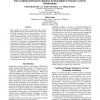Free Online Productivity Tools
i2Speak
i2Symbol
i2OCR
iTex2Img
iWeb2Print
iWeb2Shot
i2Type
iPdf2Split
iPdf2Merge
i2Bopomofo
i2Arabic
i2Style
i2Image
i2PDF
iLatex2Rtf
Sci2ools
124
click to vote
AAAI
2010
2010
Fast Conditional Density Estimation for Quantitative Structure-Activity Relationships
Many methods for quantitative structure-activity relationships (QSARs) deliver point estimates only, without quantifying the uncertainty inherent in the prediction. One way to quantify the uncertainy of a QSAR prediction is to predict the conditional density of the activity given the structure instead of a point estimate. If a conditional density estimate is available, it is easy to derive prediction intervals of activities. In this paper, we experimentally evaluate and compare three methods for conditional density estimation for their suitability in QSAR modeling. In contrast to traditional methods for conditional density estimation, they are based on generic machine learning schemes, more specifically, class probability estimators. Our experiments show that a kernel estimator based on class probability estimates from a random forest classifier is highly competitive with Gaussian process regression, while taking only a fraction of the time for training. Therefore, generic machine-lea...
AAAI 2010 | Conditional Density | Conditional Density Estimate | Conditional Density Estimation | Intelligent Agents |
| Added | 06 Dec 2010 |
| Updated | 06 Dec 2010 |
| Type | Conference |
| Year | 2010 |
| Where | AAAI |
| Authors | Fabian Buchwald, Tobias Girschick, Eibe Frank, Stefan Kramer |
Comments (0)

